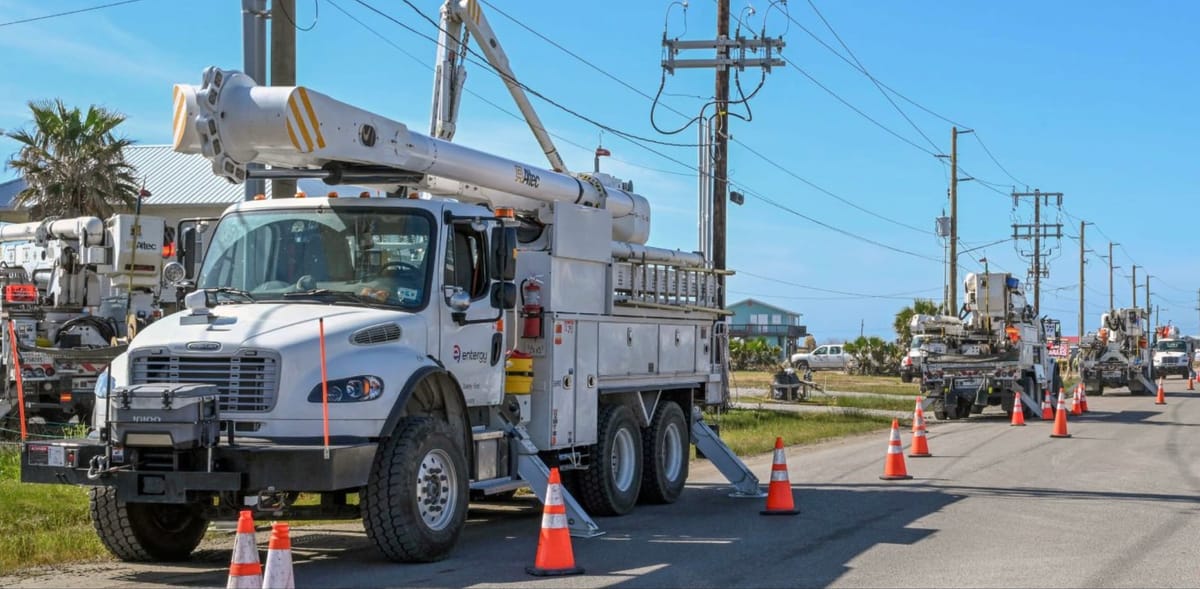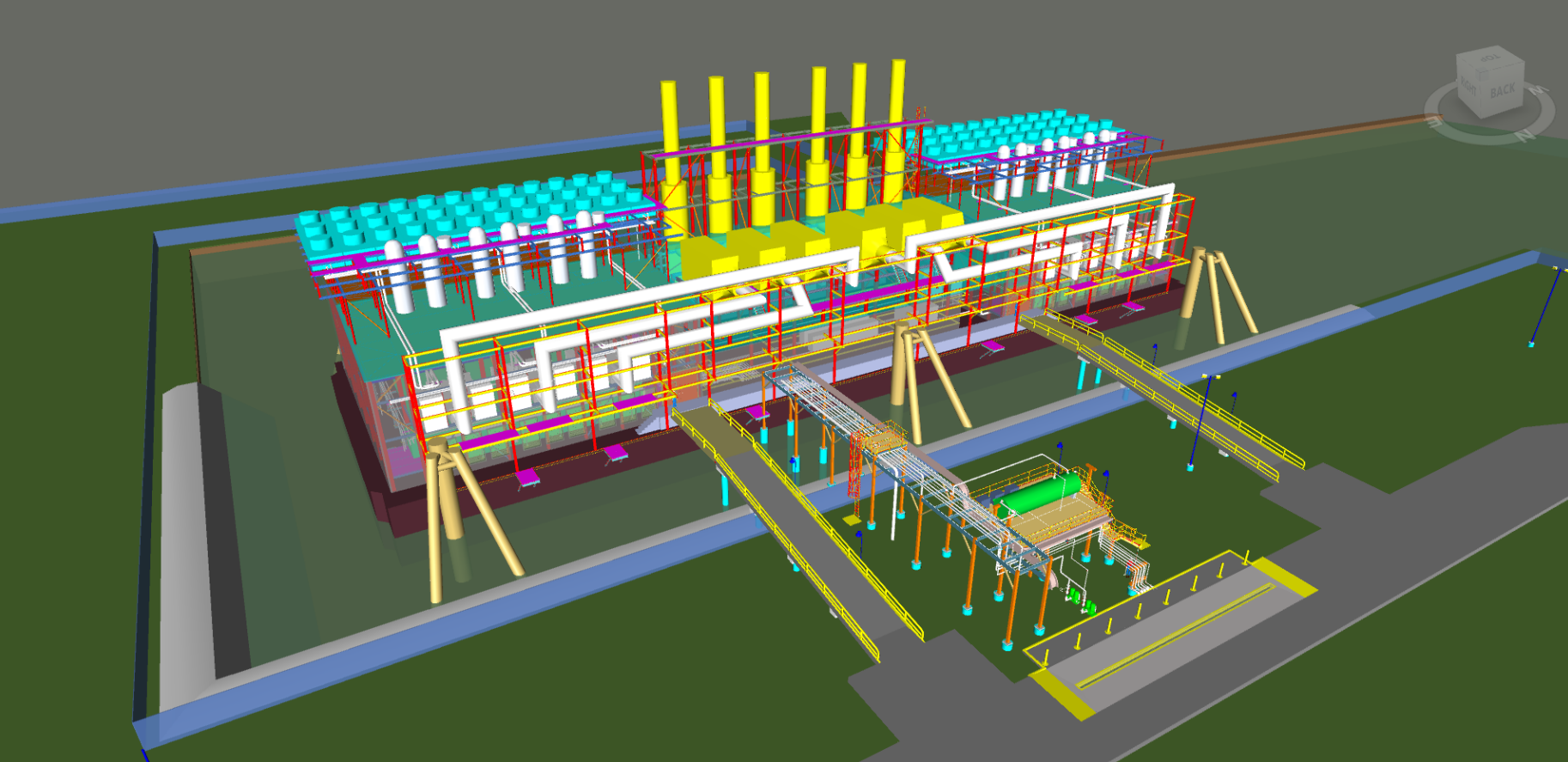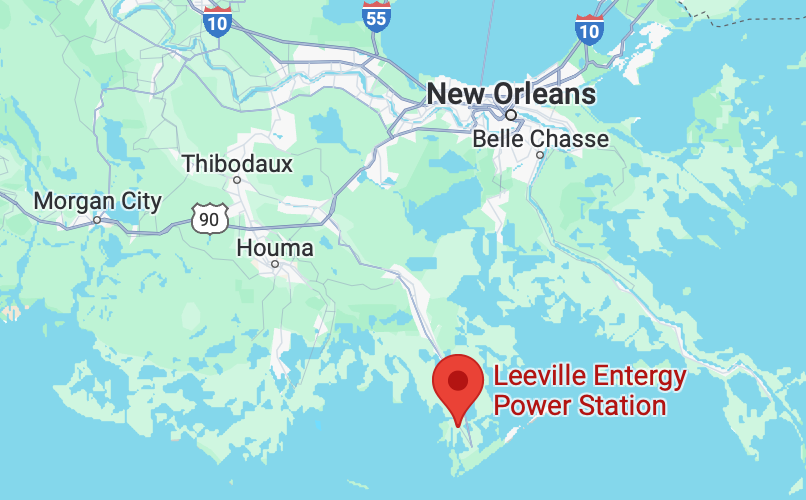Louisiana energy company plans to float above climate damage — literally
Utility argues natural gas plant would keep offshore oil and gas servicing companies, and nation’s only deepwater oil port, operational.

Published in WWNO, the Louisiana Illuminator, and Energy News Network
To make south Louisiana’s oil and gas infrastructure more resilient to extreme weather, Entergy Louisiana wants to build a $441 million floating natural gas power plant as the land around it continues to vanish from a combination of sinking and sea-level rise.
A top Louisiana utility consumer advocate noted the “loop of irony” of adding even more greenhouse gasses to a region already suffering massive land loss because of climate change.
Entergy says the plant is necessary because in 2020, Hurricane Zeta took out a major transmission line serving the area, according to its filing with the Louisiana Public Service Commission The company says the plant would be cheaper than building a new transmission line through wetlands and marshes, and it would not be “prudent or economic” to buy power on the open market. The company did not provide the cost to replace its downed transmission line.
Entergy Louisiana says its proposed 112-megawatt Bayou Power Station could disconnect from the grid and use the plant’s power to provide electricity to 7,000 residential, industrial and commercial including Port Fourchon, the Louisiana Offshore Oil Port and residents in Golden Meadow, Leeville and Grand Isle. The power station would have black-start capability — or the ability to rapidly start up and ramp down without being connected to other parts of the energy grid.
“This Project will directly address critical oil and gas customers in the system at Port Fourchon,” Entergy’s filing to the PSC. “The interconnection of the Project will add a resilient power source to the (Entergy Louisiana) grid and enable storm restoration options, following a significant weather event.”

The promises being made mirror those its sister company, Entergy New Orleans, used to convince the New Orleans City Council to approve a 128-MW natural gas plant in eastern New Orleans that came online in 2020. Entergy New Orleans said the $210 million plant would come online quickly after a storm to provide the city with power.
But that didn’t happen. After Hurricane Ida struck in August 2021, the entire city went dark, and it took almost three days for the New Orleans gas plant to become operational. The utility said using the plant’s quick-start capability wasn’t the safest way to restore power to the city.
“And so the question now is why should the Louisiana Public Service Commission approve (Bayou Power Station) seeing what happened only a handful of years ago,” asked Logan Atkinson Burke, executive director of the Alliance for Affordable Energy.
Burke noted the Bayou Power Station would cost twice as much as the New Orleans plant and produce less electricity.
The power generation portion of the project is estimated at $374.3 million, or roughly $3,318 per kilowatt, an amount twice as much as most other power generation costs, according to the federal Energy Information Administration. If the Public Service Commission approves the plant, the costs would trickle down to all Entergy Louisiana’s 1.1 million customers through increased rates and charges.
In addition to approval of the plant within 120 days, Entergy has asked the PSC for permission to bypass the competitive bid process and hand the contract to its preselected contractor, Grand Isle Shipyards.
“An RFP (request for proposals) wouldn’t have produced a more qualified vendor at a better cost,” said David Freese, a spokesman for Entergy Louisiana. The plant would be built at the company’s shipyard and moved to Leeville for installation.

Before it narrowed its options, Entergy also considered combined-cycle gas turbines, solar and simple-cycle combustion turbines, Freese said. Offshore wind was not considered because of the costs of building a transmission line to the offshore turbines, the intermittent nature of wind and the potential impact of hurricanes on those turbines, he said.
Coastal researcher Alex Kolker, an associate professor at the Louisiana Universities Marine Consortium who specializes in oceanography, geology and climate science, said the region is prone to storms and extreme weather that is being made more intense by climate change.
Utility consumer advocate Burke said it appears the company is doubling down on its reliance on fossil fuels, ignoring the inherent climate risks.
“It’s very clear that we are in a in a loop of irony at this point where the hotter it gets, the more water there is, and the less land there is as a result of oil and gas extraction, all while Louisiana is so interconnected to those international oil and gas systems,” Burke said. ”So we ‘need’ to build something that is incredibly vulnerable in a place that is vulnerable because of oil and gas."
Floodlight depends on a community of readers like you who are committed to supporting nonprofit investigative journalism. Donate to see more stories like this one.


